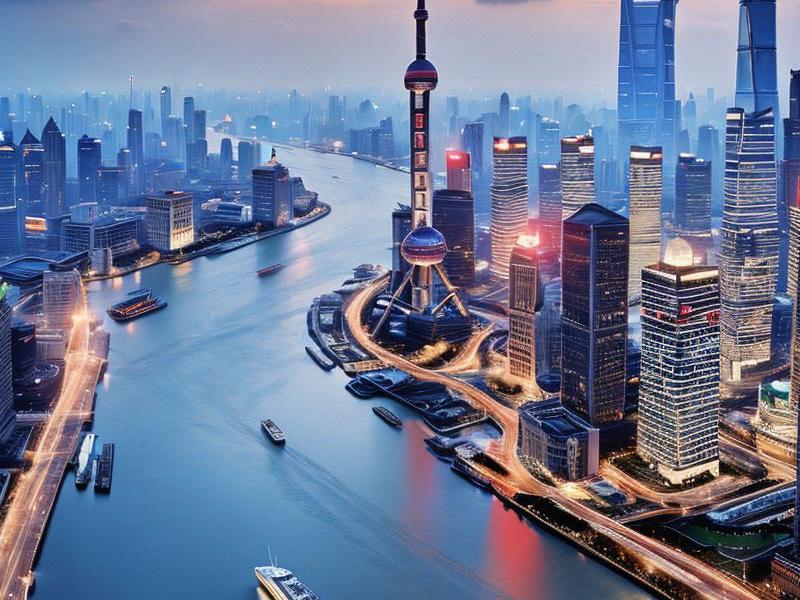
Shanghai, a city that has long been a beacon of China's economic and cultural progress, stands today as a testament to the nation's rapid development. Once a modest fishing village, Shanghai has risen to prominence as one of the world's most dynamic metropolises, embodying the spirit of modernity while preserving its rich historical heritage.
The city's journey from obscurity to global recognition is nothing short of remarkable. In the late 19th century, Shanghai was forcibly opened to foreign trade by imperialist powers, leading to the establishment of the International Settlement and the French Concession. This period of colonial influence left an indelible mark on the city's architecture, culture, and cuisine, creating a unique blend of East and West that continues to define Shanghai's identity.
As the 20th century unfolded, Shanghai's fortunes waxed and waned with the tides of history. The Communist Revolution in 1949 brought an end to the city's cosmopolitan heyday, and for decades, Shanghai was relegated to the shadows of China's political and economic landscape. However, the reform and opening-up policies initiated by Deng Xiaoping in the late 1970s marked a new chapter for Shanghai, propelling it back onto the world stage.
Today, Shanghai is a veritable symbol of China's economic might and urban development. As the country's largest city by population and a key player in global trade, Shanghai boasts an impressive skyline of modern skyscrapers, including the iconic Oriental Pearl Tower and the futuristic Shanghai Tower. These architectural marvels stand as a testament to the city's ambition and innovation, drawing millions of visitors from around the world each year.
上海龙凤论坛419 Yet, amidst the gleaming glass and steel of Shanghai's modern landscape, one can still find traces of its storied past. The Bund, a historic waterfront promenade, offers a glimpse into the city's colonial era, with its rows of Art Deco buildings and the majestic view of the Pudong skyline across the Huangpu River. Similarly, the Yu Garden, a classical Chinese garden built in the Ming Dynasty, provides a serene escape from the hustle and bustle of city life, showcasing the traditional aesthetics and craftsmanship that have long defined Shanghai's cultural identity.
The preservation of Shanghai's historical heritage is a testament to the city's commitment to balancing progress with tradition. Efforts to restore and protect its historic sites, such as the former French Concession and the Old City, reflect a growing awareness of the importance of cultural preservation in the face of rapid urbanization. These initiatives not only safeguard the city's rich history but also contribute to its unique character, making Shanghai a living museum of China's past and present.
Economically, Shanghai is a powerhouse that drives China's growth and integration into the global economy. As a major financial hub, the city is home to the Shanghai Stock Exchange, one of the largest in Asia, and a key player in international trade and investment. Its strategic location along the Yangtze River and its well-developed infrastructure make it a gateway for goods and services flowing between China and the rest of the world.
上海贵人论坛 The city's economic success is not limited to finance; Shanghai is also a leader in innovation and technology. The Zhangjiang Hi-Tech Park, often referred to as "China's Silicon Valley," is home to numerous high-tech companies and research institutions, fostering a vibrant ecosystem of entrepreneurship and innovation. This focus on technology and innovation has positioned Shanghai as a key player in China's aspirations to become a global leader in science and technology.
Culturally, Shanghai is a melting pot that embraces diversity and creativity. The city's vibrant arts scene, which includes world-class museums, theaters, and music venues, reflects its cosmopolitan spirit. The Shanghai Museum, renowned for its extensive collection of Chinese art, and the Shanghai Grand Theatre, a modern architectural masterpiece, are just two examples of the city's commitment to cultural enrichment.
Shanghai's culinary scene is another testament to its cultural fusion. From traditional Shanghainese dishes like xiaolongbao (soup dumplings) and shengjianbao (pan-fried buns) to international cuisines, the city offers a gastronomic experience that caters to all tastes. The bustling night markets and elegant restaurants are a testament to the city's vibrant food culture, where tradition and innovation meet.
爱上海419 The city's commitment to sustainability and environmental protection is also noteworthy. As one of the first cities in China to implement a low-carbon development strategy, Shanghai is investing in green technologies and sustainable urban planning. Initiatives such as the construction of energy-efficient buildings, the expansion of public transportation, and the promotion of renewable energy sources demonstrate the city's dedication to creating a more sustainable future.
Shanghai's role in China's Belt and Road Initiative further highlights its strategic importance on the global stage. As a key node in this ambitious infrastructure project, Shanghai is playing a pivotal role in connecting Asia with Europe and Africa through trade, investment, and cultural exchange. This initiative not only strengthens Shanghai's position as a global economic hub but also enhances its influence in international affairs.
In conclusion, Shanghai's renaissance is a story of resilience, innovation, and cultural preservation. From its historic roots to its modern achievements, the city exemplifies the dynamic interplay between tradition and progress. As Shanghai continues to evolve, it remains a beacon of hope and opportunity, inspiring cities around the world to embrace their unique identities while striving for a brighter future.
